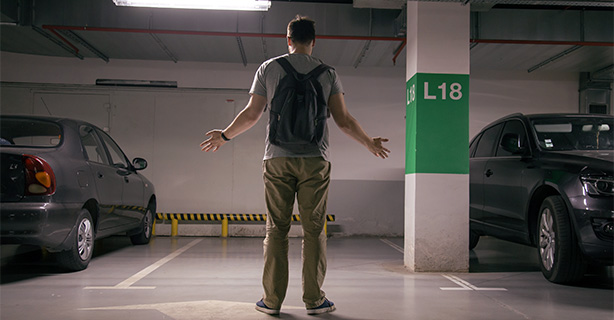What to do if your car is stolen
0 min. read
You're out and about, having a good day, and then come back to the place you parked your car, only to find it's not there. After you check in with other drivers of your car, you conclude that it's been stolen.
You're not alone. Unfortunately auto theft is a common crime in the United States, with nearly 750,000 vehicles reported stolen in 2018, according to the Insurance Information Institute. So, what do you do once you realize your car is missing?
1. Stay calm
If you find yourself in a situation where you suspect your car has been stolen, you're likely overwhelmed and upset. Stay calm and rely on the teams of people who can help you.
2. Call the police
As soon as you're able, contact the police to file a stolen vehicle report. Time is of the essence. The longer you wait to report the stolen vehicle, the lesser chance the police have of locating your car. Police reports can be filed online, in person, or over the phone.
3. Give details
Be thorough when describing your missing vehicle. Tell the officers your car's make, model, year, color, license plate number, and vehicle identification number (VIN) if you have it handy. Include any distinctive features you can recall, such as a bumper sticker, scratch, mark, or dent that can help identify your vehicle.
4. Notify your insurance company
Regardless of the coverage you have on your vehicle, contact your insurance company to notify them that your car was stolen. This will help ensure you're protected if your car is involved in an accident that causes property damage or hurts anyone while not in your possession.
To help your insurance company file your claim, have the following information on hand:
A general description of your vehicle
The last place you left your vehicle
Any personal items that were in the car when it was stolen
A copy of the vehicle's title
The location of all keys to your vehicle
Contact information of your leasing or financing company, if any
It's important to be accurate and honest in your claim. Inconsistencies between the police report and insurance claim can cause unwanted delays and investigations. It can help to keep good notes in order to remember all the facts you share from one person to the next.
While you're on the call, ask your carrier if you have rental reimbursement coverage. This coverage can help you rent another car while you're waiting to find or permanently replace your stolen vehicle.
5. Report your car stolen to the leasing or financing company
If you finance or lease your vehicle, call your leasing company to let them know about the theft and share your insurance information. In this case, your insurance company will communicate with and pay a claim directly to them, saving you time.
6. Let the police do their work
After all the paperwork's been filed, your job is to wait and see if law enforcement can recover your vehicle. If it's found, check for personal property that was left in the car, such as a phone, laptop, or jewelry. Comprehensive coverage protects your car, but your renters or home insurance might help cover other property related to your vehicle being stolen.
7. Get your car examined
If you do get your car back, it may be in a worse condition than when it was stolen. We recommend having a claims adjuster look at the vehicle to determine if there's any damage. If you contacted your insurance company after the vehicle was stolen, and you had purchased the applicable coverages, you won't be responsible for costs related to damage.
8. Prevent your car from being stolen again
There are many basic ways to protect your car from being stolen, such as:
Locking your vehicle doors
Parking your car in a safe area
Installing a car alarm system
Installing a GPS tracking system
Closing your windows and keeping valuables out of sight
Storing your keys away from your car
We hope the steps in this article help to alleviate some of the stress and trauma that can come with having your car stolen—so you can focus on moving forward.
Related links
Check out this article on what to do if you're involved in a car accident.
Have questions about car insurance? Take a look at our frequently asked questions. If this doesn't clear it up, contact a Dairyland agent today.
Make sure you have the comprehensive and collision car insurance coverage you need to help keep you safe on the road.
The general information in this blog is for informational or entertainment purposes only. View our blog disclaimer.
*Data accuracy is subject to this article's publication date.







